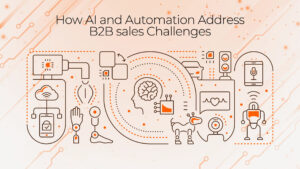We have witnessed several revolutions that changed how industries operate. From the Industrial Revolution, which introduced machines that increased production, to the Digital Revolution, which connected people and businesses globally, each shift has shaped our world. Today, we are in the midst of the AI Revolution, a new wave of change that is transforming how we work across all sectors, including B2B sales.
The rise of AI and automation is not just a trend; it is a fundamental shift that is changing how businesses engage with their customers and streamline their sales processes. For sales teams, this means rethinking traditional approaches and leveraging new technologies to become more efficient and effective.
In this blog, we will explore the impact of AI and automation on B2B sales, discussing the challenges they address, the benefits they bring, and some drawbacks to keep in mind.
Understanding the Challenges in B2B Sales
Before we dive into how AI and automation are transforming B2B sales, let’s look at some common challenges that sales teams face:
1. Identifying Quality Leads
With countless potential customers out there, finding high-quality leads can be overwhelming. Sales teams often struggle to separate serious prospects from those who are just browsing, which wastes valuable time and resources. This process becomes even more difficult when relying on manual methods, leading to missed opportunities and inefficient use of sales efforts. The ability to quickly and accurately identify leads that are most likely to convert is crucial for driving revenue and optimizing performance.
2. Customer Relationship Management
Maintaining relationships with clients is crucial for long-term success. However, it can be challenging to keep track of interactions, follow-ups, and client needs, especially when dealing with a large client base. Without an organized system in place, important tasks can slip through the cracks, leading to lost deals and weakened relationships. A lack of proper management can also result in missed opportunities for upselling or cross-selling, further impacting the bottom line.
3. Time Management
Sales professionals often juggle multiple tasks, from making calls and sending emails to preparing presentations. This can lead to inefficiencies and burnout, especially when they are overwhelmed with administrative work. Inefficient time management can also prevent sales teams from focusing on high-priority tasks, like building relationships and closing deals, which are essential to achieving sales goals. Without proper automation or support, balancing these tasks can feel like an uphill battle.
4. Data Overload
With the vast amount of data available today, sales teams may find it difficult to analyze and use this information effectively. Important insights can get buried under irrelevant data, making it harder to make informed decisions. This overwhelming volume of data can also slow down the sales process, as teams spend more time sorting through information rather than taking action. Without the right tools to organize and analyze data, sales teams risk missing valuable trends that could help improve their strategy.
How AI and Automation Address These Challenges

AI and automation offer powerful solutions to the common challenges faced by B2B sales teams, enabling them to work smarter and achieve more with less effort. Here’s how these technologies make a significant difference:
1. Simplified Lead Qualification
One of the biggest hurdles in B2B sales is identifying high-quality leads from a sea of potential prospects. AI tools streamline this process by analyzing vast amounts of customer data to pinpoint the most promising leads. By evaluating factors such as company size, industry, behavior, and engagement history, AI can rank and prioritize leads that are more likely to convert into paying customers. This means sales teams can focus their efforts on qualified prospects, saving time and increasing the chances of closing deals, rather than chasing leads that are unlikely to convert.
2. Deeper Customer Insights
Understanding customer needs is at the heart of successful B2B sales, and AI enhances this by delivering actionable insights based on customer behavior. AI can analyze how potential customers interact with your website, how they respond to email campaigns, or how often they engage with your content. These insights allow sales teams to better tailor their messaging and approach, offering more personalized and relevant solutions. By having a clearer understanding of what customers want and when they’re ready to engage, sales professionals can foster stronger relationships and increase customer satisfaction.
3. Automation of Routine Tasks
Sales teams are often bogged down by repetitive tasks, such as sending follow-up emails, entering data, or scheduling meetings. Automation tools can take over these routine responsibilities, freeing up valuable time for sales professionals to focus on higher-level activities like closing deals and building lasting relationships. For instance, automated workflows can handle initial outreach, lead nurturing, and follow-up communications without human intervention. By reducing manual workload, automation helps improve productivity and ensures that no opportunity slips through the cracks.
4. Improved Time Management
Time is one of the most precious resources for sales professionals. With AI-powered tools, managing schedules and tasks becomes much easier. AI can automatically schedule meetings based on availability, eliminating the back-and-forth often required to set up appointments. Additionally, task prioritization algorithms help sales reps focus on the most important tasks at any given time, ensuring that efforts are always aligned with the highest impact activities. This streamlining of the workday reduces stress and boosts efficiency, enabling sales teams to close more deals in less time.
The Benefits of AI and Automation in B2B Sales

Integrating AI and automation into B2B sales brings numerous advantages that can significantly enhance sales processes.
1. Increased Efficiency
One of the most significant benefits of AI and automation is improved efficiency. By automating repetitive tasks and providing valuable insights, sales teams can accomplish more in less time. This efficiency not only boosts productivity but also allows teams to focus on high-value activities, such as building relationships and closing deals.
2. Personalized Customer Experience
In today’s competitive market, customers expect a personalized experience. AI enables sales teams to tailor their approach to individual clients based on their preferences and behaviors. By delivering personalized interactions, businesses can foster trust and loyalty, which are essential for long-term success in B2B sales.
3. Data-Driven Decision Making
AI provides real-time insights into customer behavior and sales performance. This data empowers sales teams to make informed decisions, optimizing their strategies and targeting the right audience. With data at their fingertips, teams can quickly adapt to changing market conditions and customer needs.
4. Improved Lead Management
AI tools can prioritize leads based on their likelihood to convert, helping sales teams focus on the most promising prospects. This targeted approach ensures that resources are allocated effectively, leading to higher conversion rates and increased sales revenue.
How AI and Automation Improve Customer Experience

Providing an exceptional customer experience is crucial in B2B sales. Today’s buyers expect not only high-quality products and services but also personalized interactions and quick responses. Here’s how AI and automation enhance customer interactions:
1. Quick Responses
In the fast-paced world of sales, quick responses can make a significant difference. Automated systems can provide instant replies to customer inquiries, ensuring that leads receive timely information. Fast response times can improve customer satisfaction and increase the chances of conversion.
2. Consistent Communication
Automation tools can help maintain consistent communication with clients. Regular follow-ups and updates ensure that customers stay engaged throughout the sales process. This level of communication builds trust and helps to nurture relationships, ultimately leading to more successful sales outcomes.
3. Understanding Customer Needs
AI’s ability to analyze customer data enables sales teams to understand their clients’ needs better. By leveraging this information, teams can tailor their offerings and approach, leading to a more personalized experience that meets the specific needs of each client.
Potential Drawbacks of AI and Automation in B2B Sales
1. Loss of Personal Touch
Over-reliance on automation can sometimes lead to a loss of personal connection. Customers may feel like they are interacting with a machine rather than a human. It’s crucial for sales teams to strike a balance between automation and genuine human interaction to maintain trust and rapport with clients.
2. Data Privacy Concerns
The use of AI requires collecting and analyzing customer data, which can raise privacy concerns. Businesses must ensure they comply with data protection regulations and use customer data responsibly. Building trust with clients means being transparent about how their data is used.
3. Implementation Costs
Integrating AI and automation into existing systems can be expensive and time-consuming. Companies need to evaluate their budgets and resources before making such a significant investment. It’s essential to have a clear strategy for implementation to ensure a smooth transition.
Best Practices for Implementing AI and Automation in B2B Sales
1. Identify Specific Needs
Before implementing AI and automation tools, assess your sales team’s specific challenges and goals. This will help you choose the right solutions that align with your needs.
2. Start Small
Begin by automating one or two tasks that are time-consuming for your team. As you become more comfortable with the technology, gradually expand its use across other areas of your sales process.
3. Provide Training
Ensure that your sales team is well-trained in using AI and automation tools. Providing training will help them understand how to leverage these technologies effectively and maximize their benefits.
4. Monitor and Adjust
Continuously monitor the performance of your AI and automation tools. Collect feedback from your sales team and make necessary adjustments to improve their effectiveness.
5. Maintain Human Interaction
While automation is valuable, it’s crucial to maintain a human touch in your sales process. Encourage your team to engage personally with clients and build meaningful relationships.
Conclusion: The Future of B2B Sales with AI and Automation

The impact of AI and automation on B2B sales is profound. These technologies are transforming the sales landscape, providing tools that enhance efficiency, improve customer experience, and drive revenue growth. As businesses continue to embrace AI and automation, those that successfully integrate these tools into their sales processes will be well-positioned to thrive in an increasingly competitive market.
The AI Revolution is not just a passing trend; it is here to stay. By leveraging AI and automation effectively, sales teams can tackle traditional challenges, build stronger relationships with clients, and achieve greater success in B2B sales. As we navigate this new era, it is essential to strike the right balance between technology and the human touch to create lasting connections and drive growth.
In the end, embracing these technologies will not only help businesses adapt to the changing landscape but also set the stage for a brighter future in B2B sales. The journey has just begun, and the possibilities are limitless.
Ready to elevate your sales process? Let our experts at SalesHarbor guide you through the complexities of lead qualification. Book a quick intro call to discover how we can seamlessly integrate proven strategies into your business and supercharge your B2B sales pipeline.
Read another article by Marin Software.



